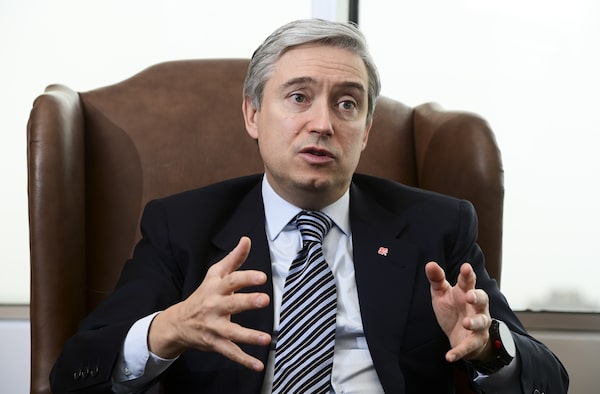
Innovation Minister François-Philippe Champagne has unveiled rewritten guidelines for Ottawa’s main scientific research granting agency amid growing concerns that Canadian universities and researchers are transferring intellectual property to China, which benefits Beijing’s military and security apparatus.Sean Kilpatrick/The Canadian Press
The federal government is imposing mandatory national-security risk assessments on funding requests from university researchers to protect Canadian intellectual property from falling into the hands of authoritarian governments.
Innovation Minister François-Philippe Champagne announced guidelines Monday for Ottawa’s main scientific research granting agency amid growing concerns that Canadian universities and researchers are transferring important data and technology to China in research partnerships – specifically to its military and security apparatus.
Researchers applying for grants through the Natural Sciences and Engineering Research Council (NSERC) will now have to complete a comprehensive security risk assessment. Any project assessed to be “higher risk” will undergo a national-security review by Canadian security agencies and a team of scientists. If judged to be too high a risk, the research will not receive government funding.
NSERC spends about $1.3-billion a year on funding research and training. However, it’s only one source of funding. The U15 Group of Canadian Research Universities, which includes many of Canada’s most research-intensive universities, says its 15 institutions conduct $8.5-billion of research annually.
The Canadian Security Intelligence Service (CSIS) has repeatedly warned that Canada is being targeted by sophisticated state-sponsored actors attempting to steal information and intelligence from researchers and companies.
For now, the risk assessment will be required for NSERC grants that involve researchers and private-sector partner organizations. The government said the process will be expanded to all federal granting councils and the Canadian Foundation for Innovation in the near future.
“The bottom line is that [research projects] that are found to be high risk will not be funded, and those which come with a low-to-medium risk assessment will be required to have risk-mitigation measures put in place,” Mr. Champagne said in an interview.
Ottawa will now scrutinize grants for research that could benefit other countries’ military, police or intelligence agencies or that focuses on critical minerals, nuclear power, critical infrastructure or technology and software subject to restrictions under the Export and Import Permits Act.
Margaret McCuaig-Johnston, a former executive vice-president of NSERC, said the guidelines are a step forward but they do not address university researchers who rely on Chinese funding.
“Money is no object in Chinese R&D, and the Chinese partner in most cases would be happy to step in to fund what would otherwise have been the NSERC portion,” she said. “This would still have Canadian researchers contributing to projects that hold a national-security risk for Canada.”
Former CSIS director Richard Fadden agreed that the measures are far too narrow.
“The guidelines seem to be limited to areas where there is federal funding,” he said. “National-security threats are hardly limited to areas receiving federal funding and these guidelines should cover all university research in a way that reflects federal responsibility for all aspects of national security.”
The federal government has been criticized for partnering with Huawei Technologies Co. Ltd. to fund computer and electrical engineering research at Canadian universities.
In February, NSERC announced it was collaborating with the Canadian arm of Huawei to fund such studies, whereas top universities in the United States and Britain have shunned further research money from Huawei over intellectual-property and national-security concerns.
NSERC put up $4.8-million for research partnerships that include Huawei. The technology giant would not divulge its contribution, saying only that it is “greater than $4.8-million.”
Some of the research includes advanced projects such as chip-to-chip communications over heterogeneous fabrics, intelligence computing memory systems and brain-inspired photonic computing.
Mr. Champagne said the new rules would not necessarily rule out funding for Huawei.
He added that he was not concerned if China is upset by the security reviews, saying the government is trying to safeguard Canadian intellectual property.
Stephanie Carvin, associate professor of international relations at the Norman Paterson School of International Affairs, said she hopes that security agencies receive additional funding to support their new role in the grant-assessment process. She also said scientists may need to be educated on possible threats. “They are not national-security analysts.”
In May, The Globe and Mail reported on the University of Alberta’s extensive scientific collaboration with China, which involves sharing and transferring research in strategically important areas such as nanotechnology, biotechnology and artificial intelligence.
Soon after, the Alberta government ordered its four major universities to suspend the pursuit of new partnerships with individuals or organizations linked to the Chinese government or Communist Party, citing concerns over national security and the risk that the research could be used to facilitate human-rights abuses. The institutions are required to provide reports to the province outlining all relationships with China.
The order affects the University of Alberta, the University of Calgary, the University of Lethbridge and Athabasca University, institutions with a strong research focus.
Mr. Champagne said he welcomed Alberta’s move.
In 2018, a Globe investigation revealed that Huawei had established a vast network of relationships with leading research-heavy universities in Canada to create a steady pipeline of intellectual property, which the company is using to underpin its market position in mobile technology.
There are growing concerns among Western countries over China’s efforts to scour the world for technology that has both civilian and military value – what Richard Fisher, senior fellow on Asian military affairs at the International Assessment and Strategy Center, has called a global “intelligence vacuum cleaner.”
A few years ago, a study by the Australian Strategic Policy Institute found that Canada had become the third-largest destination for scientists affiliated with the Chinese military.
Our Morning Update and Evening Update newsletters are written by Globe editors, giving you a concise summary of the day’s most important headlines. Sign up today.
 Robert Fife
Robert Fife Steven Chase
Steven Chase